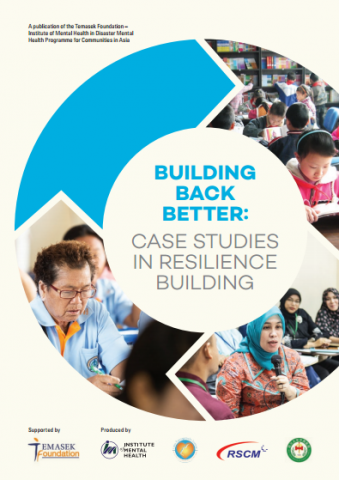Building Back Better: Case studies in Resilience Building

The publication showcases community initiatives from China (Sichuan), Indonesia, Thailand and Singapore to provide valuable lessons for the future.
Section 1 of this publication provides an overview of the “Disaster Mental Health Programme for Communities in Asia” programme’s aims and planned outcomes, and the context in which it has progressed. It also highlights the importance of the 2015 Sendai framework in advocating the inclusion of “recovery schemes to provide psychosocial and mental health services for all people in need” as a national priority in “building back better”. At the global and regional level, the recommendation is to promote platforms for the sharing of experience and learning among countries and relevant stakeholders; and the dissemination of instruments such as operational guides, lessons learnt and best practices.
Section 2 presents a summary of best practices and reports from training-of-trainers and community-based training through case studies. The case studies have been compiled by Institute of Mental Health, with support from West China Hospital, Sichuan, China; Rumah Sakit Dr. Cipto Mangunkusumo, Indonesia and Galya Rajanagarindra Institute, Thailand. They will provide an important resource for Asia and other regions around the world, and should serve as a guide for the design of future community mental health initiatives and psycho-social programmes.
Section 3 provides reflections from the community on how disaster and crisis impact lives. A range of community partners and stakeholders are represented, including regional and local governments, as well as non-governmental organisations which support recovery schemes that provide psycho-social and mental health services at community level. The case studies demonstrates diverse challenges and needs across cultural context in China, Indonesia and Thailand.
Section 4 provides insights into partnership lessons and ways forward. In the hope of inspiring change in community mental health systems, this publication goes beyond aspirational recommendations by providing descriptions of how communities affected by disaster have strived to “build back better”, which promises a much better future.
